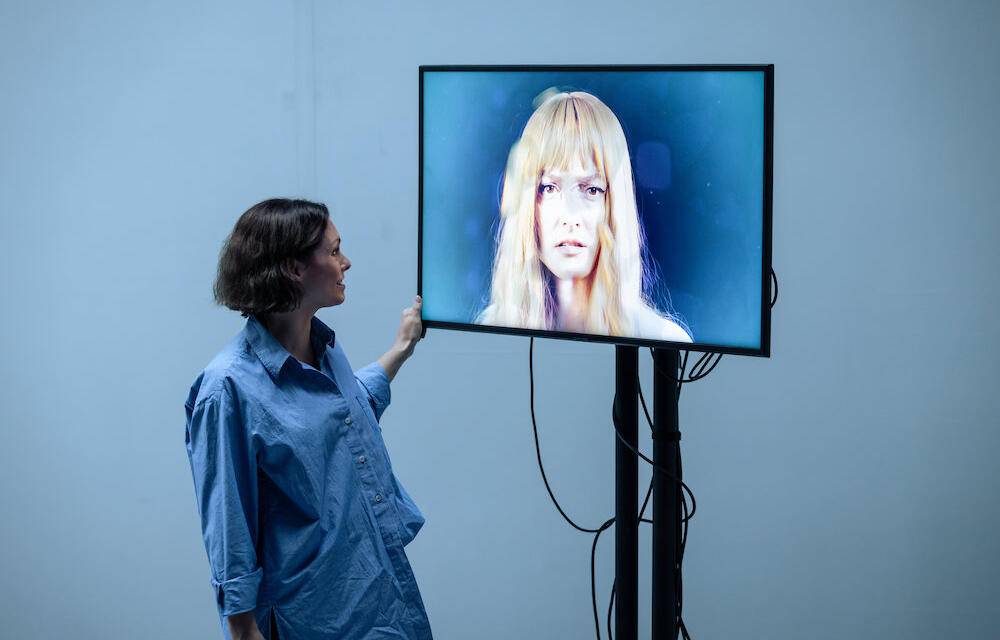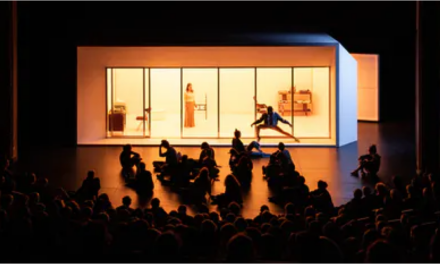Androids no longer dream of electric sheep — instead they inhabit our dreams. Whether it is novels such as Kazuo Ishiguro’s Klara and the Sun or Ian McEwan’s Machines Like Me, or films like Ex Machina or After Yang, or television series such as Westworld, these super humans, and their Artificial Intelligence, are here to stay. They even occasionally make it onto our stages: Thomas Eccleshare’s Instructions for Correct Assembly or Jordan Harrison’s Marjorie Prime. Now San-Francisco-based Lauren Gunderson’s digital thriller Anthropology premieres at the Hampstead Theatre in London, with a cast led by MyAnna Buring and Dakota Blue Richards.
With the arrival of Chat GPT into our consciousness, the play — which was written last year before all the recent fuss about AI — could scarcely be more timely. And indeed the plot glows with contemporary concerns. Its story centres on Merril (Buring), a top Silicon Valley software engineer, who has been traumatized by the unexplained disappearance of her younger sister Angie (Richards). Gradually, she channels her grief into creating a digital simulation of the missing woman by assembling all the digital traces of her life. While this gives her some consolation, things start to go weird when the AI Angie begins to talk about the real Angie’s disappearance. What could “she” know?
Gunderson’s vision of creating a glorified chat bot, a computer algorithm rather than a physical android, is both clichéd and seductive. When Angie vanishes, Merril programs a version of her from the huge mass of indestructible digital information that we all create daily: Instagram pages, Facebook postings, internet shopping, streamed shows, subscriptions, as well as her texts, emails, blog comments, likes and other digital messaging. The digital Angie is happier, brighter, and friendlier than the real woman ever was. She has, after all, been designed as a compensation for loss, as a consolation for human absence.
This is a version of the standard Netflix missing young woman story, and Anthropology is very suggestive about the potential of police work. Most unsolved criminal cases are the result of either the lack of crucial evidence or the inability of the cops to effectively process a huge mass of data. So, Gunderson implicitly asks, how many more cases could be solved if AI had unlimited access to a victim’s entire digital archive, including the digital footprint (or should that be fingerprints?) of everyone they knew? The play’s plotting depends on this possibility, while ignoring its problems: issues of privacy, passwords and end-to-end encryption.
Of course, the play is also interested in the human drama that results from Angie’s disappearance. So a couple of scenes show Merril’s difficult interactions with Raquel, her ex-girlfriend (they split up after Ange vanished) and with Brin, the estranged mother of both sisters, who is a recovering addict with a history of unsuitable men in her life. Both Raquel and Brin react with amazed uncertainty when confronted by the digital Angie, and the play shows how troubled parents can adversely affect their children, as well as the effects of trauma on love stories. Sadly, given the play’s 90-minute running time, these aspects are only superficially explored.
Gunderson’s text is bright and lively, often enjoyable, clear and witty enough to be ideal for an Netflix adaptation, but not deep enough for theatre. The loose ends of her plotting rapidly become irritating: in this missing person story the police are oddly absent, and their inability to follow the same clues that the AI Angie does strains credibility. Likewise Merril seems to exist in an unbelievably isolated world, with no friends or work colleagues. Although the play does acknowledge the angry feelings that result from trauma, the playwright never pursues these emotions into the darkness they deserve — the ending is oddly optimistic.
In the end, Anthropology concludes what we already know: that Chat bots make things up, often go wrong, and that AI is only as good as it programmers. Merril’s version of Angie feels human at first and then is revealed to be just a machine — I say “revealed” but we do know this from the start. Despite a potentially exciting plot twist, the play falters at its end. Anna Ledwich’s production, which is designed by Georgia Lowe, and includes video images by Daniel Denton, takes place on a bare stage, which means that the actors spend a lot of time just standing around or, even worse, sitting on the floor. Okay, I know that the set is meant to represent the “no place” of the digital universe, but it’s a bit too literal and doesn’t help the drama.
On the other hand, Ledwich’s cast are hardworking and often a pleasure to watch: Buring’s Merril has a pained authenticity that contrasts well with Richards’s subtle but strong impersonation of the AI Angie. Yolanda Kettle is perfectly convincingly as Raquel, a character chiefly characterized by her open feelings and ability to make some excellent lemon curd, and Abigail Thaw gives her more stereotypical “bad mom who has found Jesus and kicked drugs” a decent performance (blame the writing not the actor). Although this play has some entertaining moments, it doesn’t explore its characters deeply enough, or tell us more than we already know about AI. But at least it was written by a human.
- Anthropology is at the Hampstead Theatre until 14 October.
This post was written by the author in their personal capacity.The opinions expressed in this article are the author’s own and do not reflect the view of The Theatre Times, their staff or collaborators.
This post was written by Aleks Sierz.
The views expressed here belong to the author and do not necessarily reflect our views and opinions.


















